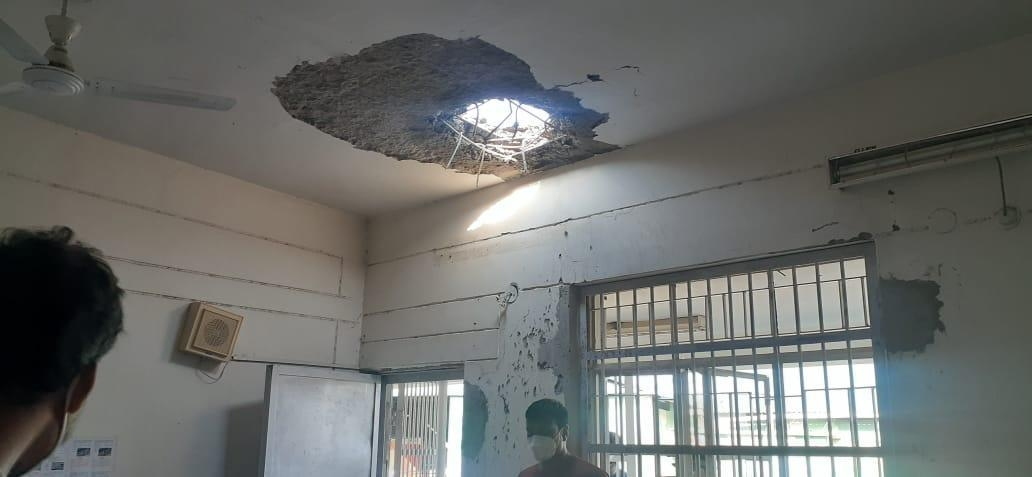The National Investigation Agency (NIA) is likely to take over investigation into the first Improvised Explosive Device (IED) attack on a military installation in India caused by an Unmanned Aerial Vehicle (UAV), believed to have been launched from a Pakistani border area on Jammu early in the morning on Sunday.
In the first-of-its-kind attack on the Indian soil, two low-intensity IEDs landed and went off one after another very close to the Air Traffic Control (ATC) tower which oversees traffic and weather for an Indian Air Force (IAF) base as well as the civilian airport at Jammu, in Jammu and Kashmir.
“Two low intensity explosions were reported early Sunday morning in the technical area of Jammu Air Force Station. One caused minor damage to the roof of a building while the other exploded in an open area”, IAF tweeted at 08:41 am on Sunday. It said that “there was no damage to any equipment. Investigation is in process along with civil agencies”. It did not mention drones but confirmed that the roof of a building had been damaged.
Most of the Defence officials as well as those in the Jammu and Kashmir Police refused to reveal anything more. Well-placed knowledgeable sources, however, revealed to India Narrative that the drone payload landed “just 30-40 feet from the ATC tower at the Air Force Station”.
“One IED, believed to be of 4-5 kg weight, landed on the roof of a building at 01:41 am and caused minor damage to it. Another of lower weight and intensity went off in an open area at 01:45 am”, said a senior official. He endorsed reports that the two IEDs had been dropped by a low-flying drone which is believed to have been launched from a border area in Pakistan, very close to Jammu. Two IAF personnel have reportedly sustained “minor injuries”.
“The nearest point on the India-Pakistan International Border (IB) is just 14 Km from the Jammu Air Force Station and the civilian airport. Such UAVs can be launched and operated easily within a distance of 30-40 km”, said the official. He confirmed that it was for the first time that an IED attack by a drone had been carried out on an IAF base which operates Mi17 helicopters and transport planes of the Army and IAF. The station is adjoining Jammu airport of the Airport Authority of India and a Military Hospital.
The officials who spoke to IndiaNarrative.com on condition of anonymity, as they are not authorised to speak to media, maintained that the two small IEDs had been dropped by a low-flying drone which could not be detected by the IAF’s radar system. They ruled out the possibility of a hand grenade or a rifle grenade attack as the spot is well in the interior of the top security zone and far away from the Jammu-Airport road and other roads where from terrorists could plan such an attack.
Preliminary reports early on Sunday said that an IAF patrolling team witnessed the first explosive being dropped from a height of about 70 metres. Another IED fell on the ground, causing minor injuries to two IAF personnel. “Had the IEDs fallen on some helicopter hangar or the ATC, these would have caused considerable damage and even disrupted the civil and defence operations in Jammu”, said an official.
“It was clear enough that this operation has been launched by a professional handler who programmed the drone with the latitude and longitude of a defence installation. It opens and drops the payload as per its programming. On several occasions in 2020 and 2021, the Pakistani side is known to have delivered arms, ammunition and drug consignments for their narco-terror networks along the IB in Jammu and Pathankot-Gurdaspur belt in Punjab. However, this is for the first time that such an offensive targeting a joint civilian-military base has been launched”, said a well-placed defence official.
Sunday’s offensive is the first significant violation of the February 26, 2021, ceasefire announced simultaneously by the Director-Generals of Military Operations of India and Pakistan.

Different teams from Bomb Disposal Squad, forensics, IAF, the J&K Police, security and intelligence agencies rushed to the spot. They were followed by a team from the NIA. Some senior officials in Srinagar were asked to cut short their preoccupations and return to Jammu immediately. Sources said that the IAF would hold its own internal inquiry but a formal investigation could be assigned to the NIA.
This being the first drone attack on a military installation in the country, the security and defence establishment is said to be worried about similar attacks on the military installations along the IB and LoC in Jammu and Kashmir. Lately, at least two drones had reportedly dropped some arms and ammunition close to the LoC in Kupwara and Baramulla districts in Kashmir.
Even as the Navy has lately started procurement of the Israeli drone system ‘Smash 2000-Plus”, the Army and the Air Force are said to be still in the process of acquiring these technologies for operational purposes. The Israeli firm ‘Smart Shooter’ has been engaged in talks with the Army and the Air Force.
The Defence Research and Development Organisation (DRDO) has reportedly developed an anti-drone system that was deployed at the Red Fort for the Independence Day address by Prime Minister Narendra Modi. According to the information available with the security agencies, the ISI has procured a large number of ‘hexacopters’ from a Chinese firm associated with the China–Pakistan Economic Corridor (CPEC) to protect their assets.
According to the reports, the Indian security forces have also made multiple recoveries of EMEI Type 97 NSR rifles manufactured by Norinco company of China. This is said to be a standard issue to the Chinese People’s Liberation Army soldiers and also provided to the Pakistan Frontier Force as part of the CPEC cooperation.
Also Read:
Most wanted militant and killer of two BJP councillors in Jammu and Kashmir killed in an encounter
Do Kashmir's murky "double dealings" stop with Waheed Para?




















